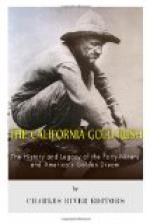Now Sutter had, of course, been naturalized in order to obtain his grant of land. He had also been appointed an official of the California-Mexican Government. Taking advantage of this fact, he was accustomed to issue permits or passports to the immigrants, permitting them to remain in the country. This gave the immigrants a certain limited standing, but, as they were not Mexican citizens, they were disqualified from holding land. Nevertheless Sutter used his good offices in showing desirable locations to the would-be settlers.[2]
[2: It is to be remarked that, prior to the gold rush, American settlements did not take place in the Spanish South but in the unoccupied North. In 1845 Castro and Castillero made a tour through the Sacramento Valley and the northern regions to inquire about the new arrivals. Castro displayed no personal uneasiness at their presence and made no attempt or threat to deport them.]
As far as the Californians were concerned, there was little rivalry or interference between the immigrants and the natives. Their interests did not as yet conflict. Nevertheless the central Mexican Government continued its commands to prevent any and all immigration. It was rather well justified by its experience in Texas, where settlement had ended by final absorption. The local Californian authorities were thus thrust between the devil and the deep blue sea. They were constrained by the very positive and repeated orders from their home government to keep out all immigration and to eject those already on the ground. On the other hand, the means for doing so were entirely lacking, and the present situation did not seem to them alarming.
Thus matters drifted along until the Mexican War. For a considerable time before actual hostilities broke out, it was well known throughout the country that they were imminent. Every naval and military commander was perfectly aware that, sooner or later, war was inevitable. Many had received their instructions in case of that eventuality, and most of the others had individual plans to be put into execution at the earliest possible moment. Indeed, as early as 1842 Commodore Jones, being misinformed of a state of war, raced with what he supposed to be English war-vessels from South America, entered the port of Monterey hastily, captured the fort, and raised the American flag. The next day he discovered that not only was there no state of war, but that he had not even raced British ships! The flag was thereupon hauled down, the Mexican emblem substituted, appropriate apologies and salutes were rendered, and the incident was considered closed. The easy-going Californians accepted the apology promptly and cherished no rancor for the mistake.




